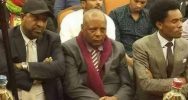By Andualem Sisay Gessesse – Ethiopian government, which has been denying political prisoners in the country, today announced its decision to stop court case of 528 political prisoners, including the Chairman of Oromo Federalist Congress, Merera Gudina (PhD).
In a statement the Federal Attorney General Getachew Ambaye, out of the total 113 individuals whose court case was dropped is those charged at federal level while the remaining are from Southern regional state of Ethiopia.
The other regional states are expected to identify and bring names of prisoners for whom they want the federal government to pardon, the Attorney General told local media this morning. There nine regional states and two city administrations in Ethiopia.
Ethiopian government’s plan to release political prisoners who were charged for committing crimes as it has been described by the regime, was announced last week Prime Minister Hailemariam Desalegn, who noted that the decision was made to bring about national consensus.
Following the Ethiopian Peoples’ Revolutionary Democratic Front (EPRDF) and its partner parties’ announcement of winning 100% the 2015 national election, the country has been dealing with several unrests and protests.
Protests in the two largest regions of the country in terms of population size, Oromia and Amhara regions respectively, have resulted in death of over a hundred people and arrests of tens of thousands. During the early October 2016 Oromo’s traditional Irecha festival some 52 protestors are dead in stamped, according to the government while the opposition estimated the number of causalities to 250.
The event was followed with Oromo youth protests in different parts of the country forcing the regime to declare a state of emergency that lasted for ten months. The government has been criticized for the way it has handled these protests, for failing to bring to justice the military commanders who ordered the killings of dozens protestors in different parts of the country.
In Amhara Region, especially in Gondar area, has also witnessed several protests and deaths of dozens with arrests of unknown number of people. The conflict began when opposition arises in Gondar (Amhara Region) against inclusion of Welkayit area into Tigray Region. It was also reported that the representatives from
While officials from Tigray region has claimed that the 1994 census has shown that 96% of the settlers in Welkait are Tigreans (people from Tigray Region) and the area has been part of Tigray since the country introduced new ethnic based federalism and regional governments.
On the contrary, those who led the opposition against the statuesque, were arguing that Welkaiyt is part of Gondar historically and the people on land are the Amhara people but systematically pushed from the area and substituted by the Tigrians.
It is not yet clear that government’s pardon is going to include one of the famous leaders of this protest Col. Demeke Zewdu and other protestors from the Amhara Region in general including areas where huge protests were reported such as, Gondar and Bahir Dar cities, among others.
